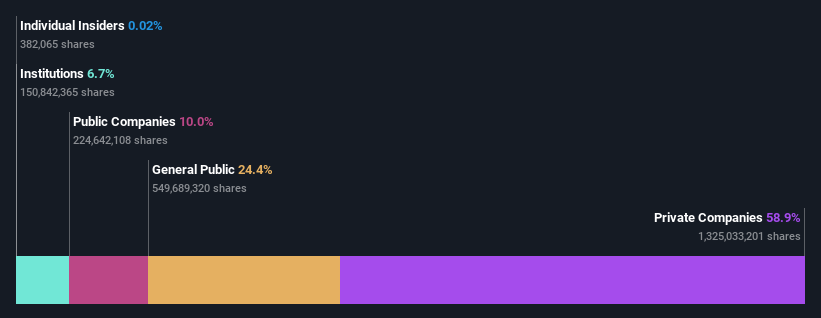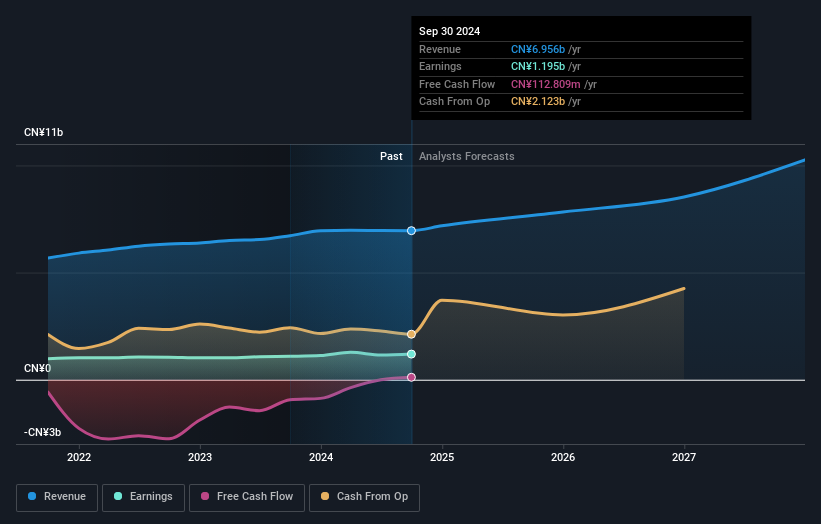- China
- /
- Infrastructure
- /
- SZSE:000582
Private companies invested in Beibu Gulf Port Co., Ltd. (SZSE:000582) copped the brunt of last week's CN¥698m market cap decline
Key Insights
- Beibu Gulf Port's significant private companies ownership suggests that the key decisions are influenced by shareholders from the larger public
- 57% of the company is held by a single shareholder (Guangxi Beibu Gulf International Port Group Co.,Ltd)
- Using data from company's past performance alongside ownership research, one can better assess the future performance of a company
Every investor in Beibu Gulf Port Co., Ltd. (SZSE:000582) should be aware of the most powerful shareholder groups. The group holding the most number of shares in the company, around 59% to be precise, is private companies. In other words, the group stands to gain the most (or lose the most) from their investment into the company.
As a result, private companies as a group endured the highest losses last week after market cap fell by CN¥698m.
Let's delve deeper into each type of owner of Beibu Gulf Port, beginning with the chart below.
See our latest analysis for Beibu Gulf Port

What Does The Institutional Ownership Tell Us About Beibu Gulf Port?
Institutions typically measure themselves against a benchmark when reporting to their own investors, so they often become more enthusiastic about a stock once it's included in a major index. We would expect most companies to have some institutions on the register, especially if they are growing.
We can see that Beibu Gulf Port does have institutional investors; and they hold a good portion of the company's stock. This implies the analysts working for those institutions have looked at the stock and they like it. But just like anyone else, they could be wrong. If multiple institutions change their view on a stock at the same time, you could see the share price drop fast. It's therefore worth looking at Beibu Gulf Port's earnings history below. Of course, the future is what really matters.

Beibu Gulf Port is not owned by hedge funds. Our data shows that Guangxi Beibu Gulf International Port Group Co.,Ltd is the largest shareholder with 57% of shares outstanding. With such a huge stake in the ownership, we infer that they have significant control of the future of the company. With 10.0% and 1.8% of the shares outstanding respectively, COSCO SHIPPING Holdings Co., Ltd. and Guangxi Industrial Investment Capital Operation Group Co., Ltd. are the second and third largest shareholders.
While it makes sense to study institutional ownership data for a company, it also makes sense to study analyst sentiments to know which way the wind is blowing. There is a little analyst coverage of the stock, but not much. So there is room for it to gain more coverage.
Insider Ownership Of Beibu Gulf Port
While the precise definition of an insider can be subjective, almost everyone considers board members to be insiders. Company management run the business, but the CEO will answer to the board, even if he or she is a member of it.
Most consider insider ownership a positive because it can indicate the board is well aligned with other shareholders. However, on some occasions too much power is concentrated within this group.
Our information suggests that Beibu Gulf Port Co., Ltd. insiders own under 1% of the company. However, it's possible that insiders might have an indirect interest through a more complex structure. It is a pretty big company, so it would be possible for board members to own a meaningful interest in the company, without owning much of a proportional interest. In this case, they own around CN¥3.1m worth of shares (at current prices). It is always good to see at least some insider ownership, but it might be worth checking if those insiders have been selling.
General Public Ownership
The general public-- including retail investors -- own 24% stake in the company, and hence can't easily be ignored. While this group can't necessarily call the shots, it can certainly have a real influence on how the company is run.
Private Company Ownership
Our data indicates that Private Companies hold 59%, of the company's shares. It might be worth looking deeper into this. If related parties, such as insiders, have an interest in one of these private companies, that should be disclosed in the annual report. Private companies may also have a strategic interest in the company.
Public Company Ownership
We can see that public companies hold 10.0% of the Beibu Gulf Port shares on issue. It's hard to say for sure but this suggests they have entwined business interests. This might be a strategic stake, so it's worth watching this space for changes in ownership.
Next Steps:
While it is well worth considering the different groups that own a company, there are other factors that are even more important. For example, we've discovered 2 warning signs for Beibu Gulf Port that you should be aware of before investing here.
If you would prefer discover what analysts are predicting in terms of future growth, do not miss this free report on analyst forecasts.
NB: Figures in this article are calculated using data from the last twelve months, which refer to the 12-month period ending on the last date of the month the financial statement is dated. This may not be consistent with full year annual report figures.
The New Payments ETF Is Live on NASDAQ:
Money is moving to real-time rails, and a newly listed ETF now gives investors direct exposure. Fast settlement. Institutional custody. Simple access.
Explore how this launch could reshape portfolios
Sponsored ContentValuation is complex, but we're here to simplify it.
Discover if Beibu Gulf Port might be undervalued or overvalued with our detailed analysis, featuring fair value estimates, potential risks, dividends, insider trades, and its financial condition.
Access Free AnalysisHave feedback on this article? Concerned about the content? Get in touch with us directly. Alternatively, email editorial-team (at) simplywallst.com.
This article by Simply Wall St is general in nature. We provide commentary based on historical data and analyst forecasts only using an unbiased methodology and our articles are not intended to be financial advice. It does not constitute a recommendation to buy or sell any stock, and does not take account of your objectives, or your financial situation. We aim to bring you long-term focused analysis driven by fundamental data. Note that our analysis may not factor in the latest price-sensitive company announcements or qualitative material. Simply Wall St has no position in any stocks mentioned.
About SZSE:000582
Beibu Gulf Port
Engages in the port loading and unloading, storage, port value-added, and port supporting services of containers and bulk cargo in China.
Average dividend payer with mediocre balance sheet.
Similar Companies
Market Insights
Weekly Picks

THE KINGDOM OF BROWN GOODS: WHY MGPI IS BEING CRUSHED BY INVENTORY & PRIMED FOR RESURRECTION


Why Vertical Aerospace (NYSE: EVTL) is Worth Possibly Over 13x its Current Price


The Quiet Giant That Became AI’s Power Grid
Recently Updated Narratives

Agfa-Gevaert is a digital and materials turnaround opportunity, with growth potential in ZIRFON, but carrying legacy risks.

Hitit Bilgisayar Hizmetleri will achieve a 19.7% revenue boost in the next five years


MINISO's fair value is projected at 26.69 with an anticipated PE ratio shift of 20x
Popular Narratives


MicroVision will explode future revenue by 380.37% with a vision towards success


Crazy Undervalued 42 Baggers Silver Play (Active & Running Mine)





